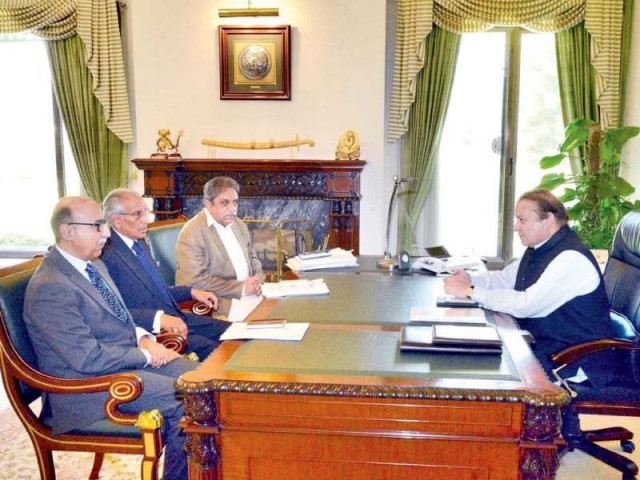Envoy downbeat about talks with Modi-led India
PM says India will have to take initiative to resume dialogue

PM Nawaz meets Pakistan’s High Commissioner to India. PHOTO: NNI
As a verbal duel between Islamabad and New Delhi rises to a crescendo, Pakistan’s top envoy on Wednesday painted a grim picture of resumption of stalled peace dialogue with the Narendra Modi-led India.
Relations between the two hyphenated neighbours are at their lowest ebb, especially after hostile statements from Indian cabinet ministers and Pakistan’s public accusations that New Delhi was aiding and abetting terrorism on its soil.
Pakistan High Commissioner to India Abdul Basit called on Prime Minister Nawaz Sharif to brief him on Pakistan-India relations, especially in the backdrop of the latest developments, according to a brief statement issued from the Prime Minister House.
“The prime minister said Pakistan is keen on developing good relations with India on the basis of sovereign equality as well as mutual respect and interest,” it added.

Sources, however, told The Express Tribune that the envoy briefed the prime minister about the situation that emerged in the wake of the Indian foreign secretary’s visit to Islamabad in March 2015 and subsequent developments.
Foreign Secretary S Jaishankar had toured Islamabad in the first week of March and held talks with his Pakistani counterpart Aizaz Ahmed Chaudhry, who is also scheduled to visit the Indian capital.
Premier Nawaz and Basit, however, agreed that due to strained relations between the two countries, triggered by a public verbal duel, the chance of Chaudhry’s visit or revival of stalled peace talks were slim.
The prime minister has publicly said that India will have to take the initiative if it wants to pursue dialogue with Pakistan. According to sources, Nawaz was dismayed by his Indian counterpart’s approach vis-à-vis Pakistan. “Pakistan wants good relations with all its neighbours, but unfortunately India is not reciprocating,” one source quoted the prime minister as saying.
“Pakistan will not beg for talks,” he said, adding that his administration would not take initiative and approach the Modi sarkar for resumption of composite dialogue process which India had suspended following the 2008 Mumbai terror siege.
Premier Nawaz’s participation in Modi’s swearing-in ceremony and subsequent exchanges of niceties between the two had rekindled hopes for revival of peace talks between their countries. The bonhomie, however, didn’t last long and New Delhi scrapped scheduled talks between the top foreign policy diplomats of the two countries after Basit hosted Kashmiri leaders in New Delhi.
Premier Nawaz and Basit also agreed that Modi-led India did not want peace talks with Pakistan and that the Hindu hardline prime minister was pursuing his domestic anti-Pakistan rhetoric as the core agenda of his government, according to sources.
Modi’s recent statement also came under discussion at the meeting. The Indian leader said on June 1 that the deadlock in talks between India and Pakistan must end. The prime minister and the Pakistani envoy also discussed India’s objections to the China-Pakistan Economic Corridor. And Nawaz Sharif directed the Foreign Office and Basit to devise Pakistan’s stance vis-à-vis India for some specific circumstances which might emerge in the coming days. Islamabad fears that New Delhi might step up its terrorist activities and covert subversive operations in Pakistan.
In such a scenario, the meeting concurred that Pakistan should neither adopt a weak stance nor continue its appeasement policy towards India. Foreign Office officials feared that if Islamabad adopted a weak stance, New Delhi would speed up its attempts to destabilise Pakistan.
Sources said Abdul Basit would reflect Pakistan’s policy vis-à-vis India on the basis of the prime minister’s directives. He will also increase his contacts with Kashmiri leaders in New Delhi.
Published in The Express Tribune, June 4th, 2015.



















COMMENTS
Comments are moderated and generally will be posted if they are on-topic and not abusive.
For more information, please see our Comments FAQ